+ Open data
Open data
- Basic information
Basic information
| Entry | Database: EMDB / ID: EMD-5592 | |||||||||
|---|---|---|---|---|---|---|---|---|---|---|
| Title | Electron cryo-microscopy of human 80S ribosome | |||||||||
 Map data Map data | Reconstruction of H. sapiens 80S ribosome | |||||||||
 Sample Sample |
| |||||||||
 Keywords Keywords | eukarya eukaryotic ribosomal ribosome 80S protein RNA cryo-electron microscopy protein synthesis mass spectrometry human | |||||||||
| Function / homology |  Function and homology information Function and homology informationSynthesis of diphthamide-EEF2 / translation at postsynapse / cytoplasmic translational elongation / ribosome hibernation / translation elongation factor binding / PML body organization / response to folic acid / SUMO binding / translation at presynapse / exit from mitosis ...Synthesis of diphthamide-EEF2 / translation at postsynapse / cytoplasmic translational elongation / ribosome hibernation / translation elongation factor binding / PML body organization / response to folic acid / SUMO binding / translation at presynapse / exit from mitosis / optic nerve development / response to insecticide / eukaryotic 80S initiation complex / negative regulation of protein neddylation / regulation of translation involved in cellular response to UV / positive regulation of cytoplasmic translation / axial mesoderm development / negative regulation of formation of translation preinitiation complex / regulation of G1 to G0 transition / retinal ganglion cell axon guidance / ribosomal protein import into nucleus / oxidized pyrimidine DNA binding / response to TNF agonist / negative regulation of endoplasmic reticulum unfolded protein response / positive regulation of base-excision repair / protein-DNA complex disassembly / positive regulation of respiratory burst involved in inflammatory response / positive regulation of intrinsic apoptotic signaling pathway in response to DNA damage by p53 class mediator / positive regulation of intrinsic apoptotic signaling pathway in response to DNA damage / positive regulation of gastrulation / 90S preribosome assembly / protein tyrosine kinase inhibitor activity / positive regulation of endodeoxyribonuclease activity / nucleolus organization / IRE1-RACK1-PP2A complex / positive regulation of Golgi to plasma membrane protein transport / TNFR1-mediated ceramide production / alpha-beta T cell differentiation / negative regulation of DNA repair / negative regulation of RNA splicing / GAIT complex / positive regulation of DNA damage response, signal transduction by p53 class mediator / aggresome / TORC2 complex binding / G1 to G0 transition / supercoiled DNA binding / NF-kappaB complex / neural crest cell differentiation / oxidized purine DNA binding / cysteine-type endopeptidase activator activity involved in apoptotic process / middle ear morphogenesis / positive regulation of ubiquitin-protein transferase activity / negative regulation of intrinsic apoptotic signaling pathway in response to hydrogen peroxide / negative regulation of bicellular tight junction assembly / regulation of establishment of cell polarity / ubiquitin-like protein conjugating enzyme binding / rRNA modification in the nucleus and cytosol / negative regulation of phagocytosis / erythrocyte homeostasis / Formation of the ternary complex, and subsequently, the 43S complex / cytoplasmic side of rough endoplasmic reticulum membrane / negative regulation of ubiquitin protein ligase activity / protein kinase A binding / laminin receptor activity / homeostatic process / ion channel inhibitor activity / lncRNA binding / Uptake and function of diphtheria toxin / Ribosomal scanning and start codon recognition / pigmentation / Translation initiation complex formation / positive regulation of mitochondrial depolarization / macrophage chemotaxis / lung morphogenesis / positive regulation of T cell receptor signaling pathway / fibroblast growth factor binding / negative regulation of Wnt signaling pathway / positive regulation of natural killer cell proliferation / male meiosis I / monocyte chemotaxis / TOR signaling / negative regulation of translational frameshifting / BH3 domain binding / Protein hydroxylation / positive regulation of activated T cell proliferation / SARS-CoV-1 modulates host translation machinery / iron-sulfur cluster binding / regulation of adenylate cyclase-activating G protein-coupled receptor signaling pathway / regulation of cell division / cellular response to ethanol / mTORC1-mediated signalling / Peptide chain elongation / skeletal muscle cell differentiation / Selenocysteine synthesis / Formation of a pool of free 40S subunits / positive regulation of intrinsic apoptotic signaling pathway by p53 class mediator / cellular response to actinomycin D / endonucleolytic cleavage to generate mature 3'-end of SSU-rRNA from (SSU-rRNA, 5.8S rRNA, LSU-rRNA) / translational elongation / Eukaryotic Translation Termination Similarity search - Function | |||||||||
| Biological species |  Homo sapiens (human) Homo sapiens (human) | |||||||||
| Method | single particle reconstruction / cryo EM / Resolution: 5.0 Å | |||||||||
 Authors Authors | Anger AM / Armache J-P / Berninghausen O / Habeck M / Subklewe M / Wilson DN / Beckmann R | |||||||||
 Citation Citation |  Journal: Nature / Year: 2013 Journal: Nature / Year: 2013Title: Structures of the human and Drosophila 80S ribosome. Authors: Andreas M Anger / Jean-Paul Armache / Otto Berninghausen / Michael Habeck / Marion Subklewe / Daniel N Wilson / Roland Beckmann /  Abstract: Protein synthesis in all cells is carried out by macromolecular machines called ribosomes. Although the structures of prokaryotic, yeast and protist ribosomes have been determined, the more complex ...Protein synthesis in all cells is carried out by macromolecular machines called ribosomes. Although the structures of prokaryotic, yeast and protist ribosomes have been determined, the more complex molecular architecture of metazoan 80S ribosomes has so far remained elusive. Here we present structures of Drosophila melanogaster and Homo sapiens 80S ribosomes in complex with the translation factor eEF2, E-site transfer RNA and Stm1-like proteins, based on high-resolution cryo-electron-microscopy density maps. These structures not only illustrate the co-evolution of metazoan-specific ribosomal RNA with ribosomal proteins but also reveal the presence of two additional structural layers in metazoan ribosomes, a well-ordered inner layer covered by a flexible RNA outer layer. The human and Drosophila ribosome structures will provide the basis for more detailed structural, biochemical and genetic experiments. | |||||||||
| History |
|
- Structure visualization
Structure visualization
| Movie |
 Movie viewer Movie viewer |
|---|---|
| Structure viewer | EM map:  SurfView SurfView Molmil Molmil Jmol/JSmol Jmol/JSmol |
| Supplemental images |
- Downloads & links
Downloads & links
-EMDB archive
| Map data |  emd_5592.map.gz emd_5592.map.gz | 3.5 MB |  EMDB map data format EMDB map data format | |
|---|---|---|---|---|
| Header (meta data) |  emd-5592-v30.xml emd-5592-v30.xml emd-5592.xml emd-5592.xml | 9 KB 9 KB | Display Display |  EMDB header EMDB header |
| Images |  emd_5592_1.jpg emd_5592_1.jpg | 359.2 KB | ||
| Archive directory |  http://ftp.pdbj.org/pub/emdb/structures/EMD-5592 http://ftp.pdbj.org/pub/emdb/structures/EMD-5592 ftp://ftp.pdbj.org/pub/emdb/structures/EMD-5592 ftp://ftp.pdbj.org/pub/emdb/structures/EMD-5592 | HTTPS FTP |
-Validation report
| Summary document |  emd_5592_validation.pdf.gz emd_5592_validation.pdf.gz | 389.3 KB | Display |  EMDB validaton report EMDB validaton report |
|---|---|---|---|---|
| Full document |  emd_5592_full_validation.pdf.gz emd_5592_full_validation.pdf.gz | 388.9 KB | Display | |
| Data in XML |  emd_5592_validation.xml.gz emd_5592_validation.xml.gz | 4.3 KB | Display | |
| Arichive directory |  https://ftp.pdbj.org/pub/emdb/validation_reports/EMD-5592 https://ftp.pdbj.org/pub/emdb/validation_reports/EMD-5592 ftp://ftp.pdbj.org/pub/emdb/validation_reports/EMD-5592 ftp://ftp.pdbj.org/pub/emdb/validation_reports/EMD-5592 | HTTPS FTP |
-Related structure data
| Related structure data |  4v6xMC  5591C  4v6wC M: atomic model generated by this map C: citing same article ( |
|---|---|
| Similar structure data |
- Links
Links
| EMDB pages |  EMDB (EBI/PDBe) / EMDB (EBI/PDBe) /  EMDataResource EMDataResource |
|---|---|
| Related items in Molecule of the Month |
- Map
Map
| File |  Download / File: emd_5592.map.gz / Format: CCP4 / Size: 66.6 MB / Type: IMAGE STORED AS FLOATING POINT NUMBER (4 BYTES) Download / File: emd_5592.map.gz / Format: CCP4 / Size: 66.6 MB / Type: IMAGE STORED AS FLOATING POINT NUMBER (4 BYTES) | ||||||||||||||||||||||||||||||||||||||||||||||||||||||||||||||||||||
|---|---|---|---|---|---|---|---|---|---|---|---|---|---|---|---|---|---|---|---|---|---|---|---|---|---|---|---|---|---|---|---|---|---|---|---|---|---|---|---|---|---|---|---|---|---|---|---|---|---|---|---|---|---|---|---|---|---|---|---|---|---|---|---|---|---|---|---|---|---|
| Annotation | Reconstruction of H. sapiens 80S ribosome | ||||||||||||||||||||||||||||||||||||||||||||||||||||||||||||||||||||
| Projections & slices | Image control
Images are generated by Spider. generated in cubic-lattice coordinate | ||||||||||||||||||||||||||||||||||||||||||||||||||||||||||||||||||||
| Voxel size | X=Y=Z: 1.2375 Å | ||||||||||||||||||||||||||||||||||||||||||||||||||||||||||||||||||||
| Density |
| ||||||||||||||||||||||||||||||||||||||||||||||||||||||||||||||||||||
| Symmetry | Space group: 1 | ||||||||||||||||||||||||||||||||||||||||||||||||||||||||||||||||||||
| Details | EMDB XML:
CCP4 map header:
| ||||||||||||||||||||||||||||||||||||||||||||||||||||||||||||||||||||
-Supplemental data
- Sample components
Sample components
-Entire : Human 80S ribosome from PBMCs
| Entire | Name: Human 80S ribosome from PBMCs |
|---|---|
| Components |
|
-Supramolecule #1000: Human 80S ribosome from PBMCs
| Supramolecule | Name: Human 80S ribosome from PBMCs / type: sample / ID: 1000 / Number unique components: 1 |
|---|---|
| Molecular weight | Experimental: 4.5 MDa / Theoretical: 4.5 MDa |
-Supramolecule #1: 80S ribosome
| Supramolecule | Name: 80S ribosome / type: complex / ID: 1 / Recombinant expression: No / Database: NCBI / Ribosome-details: ribosome-eukaryote: ALL |
|---|---|
| Source (natural) | Organism:  Homo sapiens (human) / Strain: Armache & Anger (AA) PBMCs / synonym: human / Tissue: Blood Homo sapiens (human) / Strain: Armache & Anger (AA) PBMCs / synonym: human / Tissue: Blood |
| Molecular weight | Experimental: 4.5 MDa / Theoretical: 4.5 MDa |
-Experimental details
-Structure determination
| Method | cryo EM |
|---|---|
 Processing Processing | single particle reconstruction |
| Aggregation state | particle |
- Sample preparation
Sample preparation
| Buffer | pH: 7.5 |
|---|---|
| Vitrification | Cryogen name: ETHANE / Chamber humidity: 100 % / Instrument: FEI VITROBOT MARK IV Method: Before plunging, blot for 3 seconds using two layers of filter paper. |
- Electron microscopy
Electron microscopy
| Microscope | FEI TITAN KRIOS |
|---|---|
| Date | Feb 6, 2011 |
| Image recording | Category: CCD / Film or detector model: FEI EAGLE (4k x 4k) / Number real images: 30000 / Average electron dose: 20 e/Å2 |
| Electron beam | Acceleration voltage: 200 kV / Electron source:  FIELD EMISSION GUN FIELD EMISSION GUN |
| Electron optics | Calibrated magnification: 90000 / Illumination mode: FLOOD BEAM / Imaging mode: BRIGHT FIELD / Cs: 2.7 mm / Nominal defocus max: 3.5 µm / Nominal defocus min: 0.8 µm / Nominal magnification: 90000 |
| Sample stage | Specimen holder model: FEI TITAN KRIOS AUTOGRID HOLDER |
| Experimental equipment |  Model: Titan Krios / Image courtesy: FEI Company |
- Image processing
Image processing
| Details | The particles were selected using an automatic selection program. |
|---|---|
| CTF correction | Details: each subvolume |
| Final reconstruction | Algorithm: OTHER / Resolution.type: BY AUTHOR / Resolution: 5.0 Å / Resolution method: FSC 0.5 CUT-OFF / Software - Name: Spider / Number images used: 343343 |
 Movie
Movie Controller
Controller



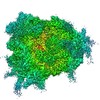


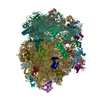

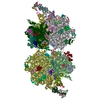
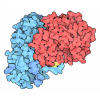

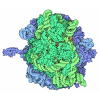
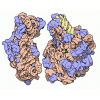
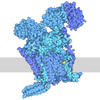


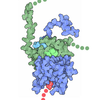

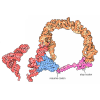

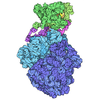

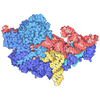



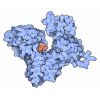








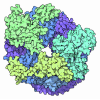

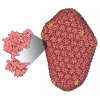




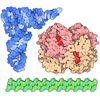
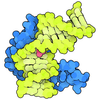


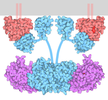

 Z (Sec.)
Z (Sec.) X (Row.)
X (Row.) Y (Col.)
Y (Col.)





















